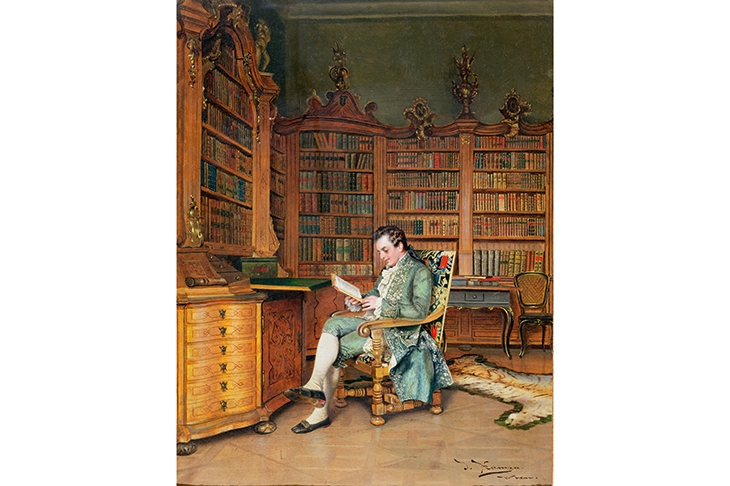In the spring of 1998, Rolling Stones fans in Germany were disappointed to hear that the band had been forced to cancel a string of gigs. Keith Richards, the ne plus ultra of rock’s wild men, had damaged a rib in a tumble from a ladder while trying to retrieve a book from one of the higher shelves in his Connecticut library. Hide that smirk: it could just be true. Keef, it turns out, has not one but two extensive libraries — on either side of the Atlantic — and even went as far as applying the Dewey Decimal System to bring his sprawling collections into some kind of order. An addictive personality by any measure, Richards clearly has the book-collecting bug — and bibliomania, as Stuart Kells’s entertaining history cautions, can be a cruel mistress.
Actually, what’s on offer in The Library is something looser than a history. It’s more an anthology of library lore, a rogues’ gallery of shady bookrunners and venal bibliophiles. Here we meet Henry Folger, the oil millionaire, who in the early 20th century hoovered up every Shakespeare folio on the market and kept them wrapped in brown paper and scattered in bank vaults around the US.
Or Poggio Bracciolini, the Renaissance scholar who toured the monasteries of the early 15th century like an unscrupulous antiques dealer, sucking his teeth and offering to take their early manuscripts off their hands for a fraction of their value. (One imagines his well-rehearsed patter: ‘Cicero? Such a shame: a pagan. Not much call for this sort of thing nowadays. Tell you what I’ll do…’)
Or Count Guglielmo Libri, born in Florence in 1803, a prodigious book thief who, in an appointment which proved to be spectacularly misjudged, was given the role of secretary of the commission to catalogue all manuscripts in French libraries.
Or Richard Heber, whose biblio-mania reached truly deranged degrees –– ‘no confirmed drunkard, no incurable opium-eater, had less self-control’ — and who filled eight houses with his collection, remarking that ‘no gentleman can be without three copies of a book: one for show, one for use and one for borrowers’.
Kells also dwells on the many physical forms that libraries can take, from the monumental to the personal. Thus we are introduced to the anti-Tardis of the Folger Shakespeare Library in Washington DC, designed to fit in with the imperial modernism of its Capitol Hill neighbours, but decorated inside like a 16th-century Stratfordian cottage (‘the First Folio, illustrated’, as its benefactress Emily Folger put it).
But Kells also gives us the young Jeanette Winterson, acquiring books (by Freud, and D.H. Lawrence) that were contraband in the eyes of her Pentecostal parents and stashing them under her mattress: ‘Anyone with a single bed, standard size, and paperbacks, standard size, will find that 77 can be accommodated per layer.’ And then there are intangible libraries, libraries of the mind, such as the corpus of dreaming stories of the indigenous Australians, or Jorge Luis Borges’s immeasurable library of Babel, a repository perhaps for the output of those infinite typing monkeys.
So what, then, is a library exactly? Kells offers the simple definition: ‘An organised collection of texts.’ But organised is a tricky word here. The books under Winterson’s mattress were organised, presumably, into a 6ft x 3ft rectangle. Is that what qualifies them as a library? Surely not. At its most general, we could say that any collection has one basic organising principle: the collector. My library is a library because I — a particular reader with particular proclivities — have acquired these books and not others.
But, as Keith Richards knows, a good library is as much about the ordering as the contents. Curiously absent from Kells’s wide-ranging book are the histories of the great classification systems, from the Pinakes of Callimachus, the vast catalogue of the library of Alexandria, to the decimal schemes of Melvil Dewey in the 19th century and Paul Otlet in the 20th. Making libraries navigable was the original Big Data problem; alphabetical order was the profoundly innovative solution.
Perhaps it is apt that Kells’s investigations don’t go as far as ordering systems. Reading The Library, one has the impression of a bookshelf toppling over, spilling its contents willy-nilly. Facts and anecdotes — good ones, well-told — tumble forth. Stories are interrupted with other stories, momentary and tangential, jumping centuries forward for a few brief sentences, then jumping back again. The effect is often confusing, though rarely unpleasant. Kells comes across as a garrulous but entertaining speaker, brimming over with too many tales to tell, and an enthusiasm that — for the most part — keeps the wheels spinning across the gaps and chicanes of his rough narrative. And if The Library lacks the serene elegance of a well-ordered library itself, it is nevertheless full of the delights of well-stocked Wunderkammer.






Comments